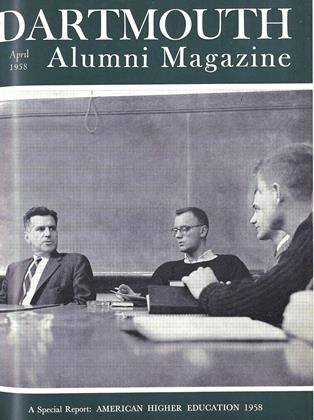Dartmouth's voice now booms up the valley and through the hills eighteen hours a day. WDCR, nee DBS, is now operating at 1340 kc. on a power of 250 watts by authority of the Federal Communications Commission.
The "Big Voice" started on March 4, 1958 when Dick Harris '58, of New Britain, Conn., stood before the microphone in College Hall. In back of him on the dais were Jerry Danzig '34, Vice President of NBC, and representatives from the faculty, the student body, and the town. The Barbary Coast sat on their bandstand, and the Glee Club's Injunaires were on hand to share the first piece of 250-watt air.
At precisely 8:58 p.m. the Glee Club's "Men of Dartmouth" was broadcast; then Dick Harris said, "This is Dartmouth College Radio, 1340 on your dial," and the station was in business.
Dick's voice, quite appropriately, was the first on the new air. He had worked for all of his tenure as station manager toward that evening. For months, he and his staff had handled the mass of detail for the FCC forms and made plans for the new programming schedule. The year before, Frank Sauter '57 had done the same and the station managers preceding him had done their parts to lead to that inaugural broadcast. Because of them, Ronald F. Kehoe '59, an English Honors major and the present station manager, has the biggest student radio job in America.
Dick Harris attended the public schools in New Britain. In high school, he showed a fine potential both in the classroom and extracurricular activities and, in his senior year, he had a radio show every Saturday afternoon over New Britain's WHAY.
In the fall of Dick's freshman year, a meeting was held to discuss the future of student radio at Dartmouth. The limited radiation devices used by the station to transmit its signal were just not limited enough: according to stringent FCC regulations, the station was much too powerful. Considerable effort had been made to restrict the signal and still cover a good portion of the campus, but nothing could be devised to do the trick. Should coaxial cables be buried throughout the campus and link all college buildings? Not satisfactory: too costly and the station would not reach faculty homes. Should the station shift to an educational FM status? Not satisfactory: there were few FM receivers among the audience and the educational status would cancel out the benefits of men participating in the business side of the station. Were there other possibilities? None that would preserve the spirit of the station and do the job.
And spirit has had a lot to do with the outstanding success of radio at Dartmouth. In the years since World War II, there has been a succession of topnotch station directorates, each transmitting to its successor a tradition of operating the station according to professional standards. In the fall of 1955, Dartmouth's Board of Trustees endorsed the idea of a new WDBS as a 250-watt commercially licensed station and emphasized their confidence by authorizing the necessary loan to purchase a new transmitter, tower and related equipment.
The 100-man station will operate on a non-profit, commercial basis. It will be completely student-operated and, as such, will be the only station of its type in the United States. (Dr. Huntington W. Curtis, of the Thayer School, the holder of a First Class Engineer's license, is the chief engineer, as required by FCC regulations.)
Dick Harris, holder of the Martin L. Straus III Memorial Scholarship, is a worker - with a flair for organization. During his days at the station he also worked about 18 hours a week waiting on table at Stell Hall. Now, as an unemployed Hanover broadcaster, he has taken on two other jobs and puts in about 37 hours a week besides his firstyear Tuck studies.
The vote along Main Street, in the Junction, and in Thetford Hill is all for the station. They have heard the voice and they like its sound.
Dick Harris '58
 View Full Issue
View Full Issue
More From This Issue
-
 Feature
FeatureAMERICAN HIGHER EDUCATION 1958
April 1958 -
 Feature
FeatureIt's Spring and Job Time for Seniors
April 1958 By JAMES B. FISHER '54 -
 Feature
FeatureCollege Plans April Music Festival
April 1958 -
 Feature
FeatureHanover Holiday, 1958
April 1958 -
 Class Notes
Class Notes1918
April 1958 By ERNEST H. EARLEY, RICHARD A. HOLTON -
 Class Notes
Class Notes1910
April 1958 By RUSSELL D. MEREDITH, ANDREW J. SCARLETT
R.L.A.
Article
-
 Article
ArticleWASHINGTON'S BIRTHDAY PARTY AT THE INN
March 1917 -
 Article
ArticleMILITARY ORGANIZATIONS AT DARTMOUTH IN CIVIL WAR DAYS
January 1919 -
 Article
Article1400 Expected to Return For Reunion Weekend
June 1953 -
 Article
ArticleAlumni Articles
JANUARY 1963 -
 Article
ArticleAlumni Awards
Nov/Dec 2003 By Lauren Gee '03 -
 Article
ArticleCLASS OF 1915
June 1916 By Leo M. Folan







